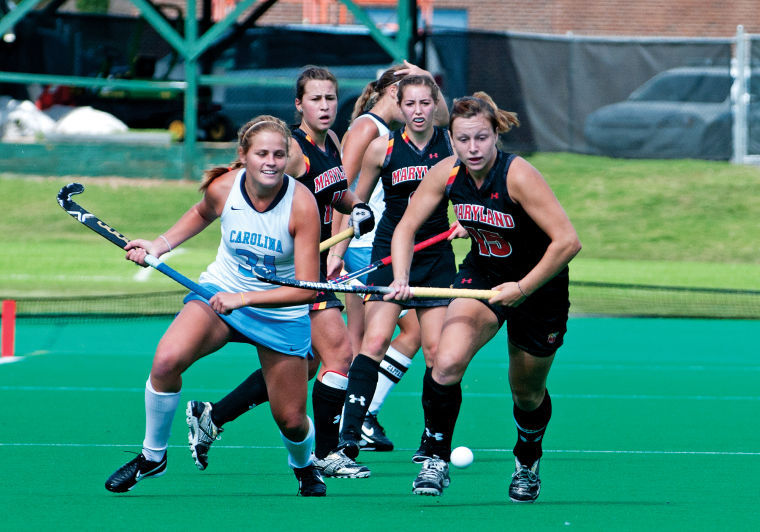
Megan Frazer
Natalie Hunter possesses a strong, winning resume. With two national titles in her three seasons with the Terrapins field hockey team, it would be understandable if she viewed any achievements leading up to a national championship as supplementary.
But as the goalkeeper recalls her best memories with the Terps, a sunny November afternoon on the sideline at Wake Forest’s Kentner Stadium in Winston-Salem, N.C., is the one that stands out. In 2010, the Terps beat North Carolina 5-2 to win their third straight ACC Championship.
“Just winning that, it’s amazing,” Hunter said. “It’s [an] irreplaceable feeling.”
Along with the rest of the Terps’ senior class, she experienced that feeling as a freshman but hasn’t relived it since. As the team enters its final season in the ACC before moving to the Big Ten conference in July, Hunter and the rest of the squad are looking to raise the ACC trophy for the last time.
For the past two decades, the ACC has been the undisputed force in field hockey. Teams from the conference have won 15 of the past 20 national titles, while 14 of them in that span have been runners-up. In many cases, the ACC tournament is a competition among the nation’s most realistic title contenders. It’s part of what makes the ACC the most competitive field hockey conference in the country.
Though the ACC is losing one of its most prominent members, the history the Terps have made will be part of the conference’s legacy as both move forward. As for the Terps, they will try to continue bolstering their own legacy and that of the Big Ten.
“I think what I look at is the number of championship coaches and championship programs [in the ACC],” coach Missy Meharg said. “My hope is that it will be disseminated even more as these leagues change.”
THE POWERHOUSE RIVALRY
In NCAA field hockey, the biggest game each season is often between the Terps and North Carolina.
With 14 national titles and 27 ACC championships between them, the Terps and Tar Heels usually face each other as the top two teams in the nation each year.
“Carolina-Maryland has [had] some pretty intense games,” Meharg said. “It’s something I’m really going to miss.”
The differences between the teams’ results are negligible. While Meharg has won seven national championships and nine ACC titles in 26 seasons with the Terps, Tar Heels coach Karen Shelton has collected six national championships and 18 conference titles in her 32 years with the team. North Carolina leads the all-time series, but the Terps are 3-2 against the Tar Heels in the NCAA title game.
“The UNC game is always a great matchup,” Hunter said. “Because we are both very big powerhouse teams … that’s always the game that we’re all looking for during the season.”
The two have faced each other in three of the past four national championships, most recently in the 2011 title game in Louisville, Ky. The Terps came back from a 2-0 deficit in the final four minutes of the game. Then, in overtime, forward Jill Witmer scored the game-winning goal to complete the team’s late comeback.
“I just had so much energy,” Witmer said. “I wasn’t thinking at all. I just went.”
Though the Terps have had many memorable encounters with the Tar Heels, they will need to decide if they want to pursue scheduling nonconference games against North Carolina. The programs are situated almost 300 miles apart, and Meharg is unsure of where the Tar Heels will fit in a nonconference schedule, which traditionally features closer teams such as Old Dominion, Princeton and American.
But given the late postseason runs, the Terps and the Heels tend to make each season, it’s likely they will continue meeting again in the future.
“I don’t think that those rivalries will go away,” Hunter said. “We’re going to see them in NCAA [tournaments] and be just as ready to play them.”
NEW CHALLENGE AHEAD
Though the Big Ten doesn’t have a history comparable to the ACC, the conference still has strong opponents that can provide a stern challenge for the Terps in 2014.
Four teams from the Big Ten are ranked in the top 15: Penn State, Michigan, Northwestern and Iowa. Additionally, the Terps will face farther travels for their conference games.
Bus rides to North Carolina and Virginia will soon turn into flights to Michigan and Iowa. With that in mind, the Terps will need to make more adjustments off the field as well.
“It’s going to be difficult to do school and field hockey,” said midfielder Anna Dessoye. “We’re going to have to fly a lot, which will be a challenge.”
The team’s new obstacles heading into the Big Ten are very similar to what the university’s other sports have to go through, as well. While the Terps will remember the accomplishments they have had in the ACC and will try to add to it this season, they look ahead to their new conference with optimism.
“I will miss the ACC very much because it’s what I’m used to, but I’m also exceedingly excited for change,” Meharg said. “This is what the life of a student-athlete and a coach in this system is today. I’m looking forward to it.”



